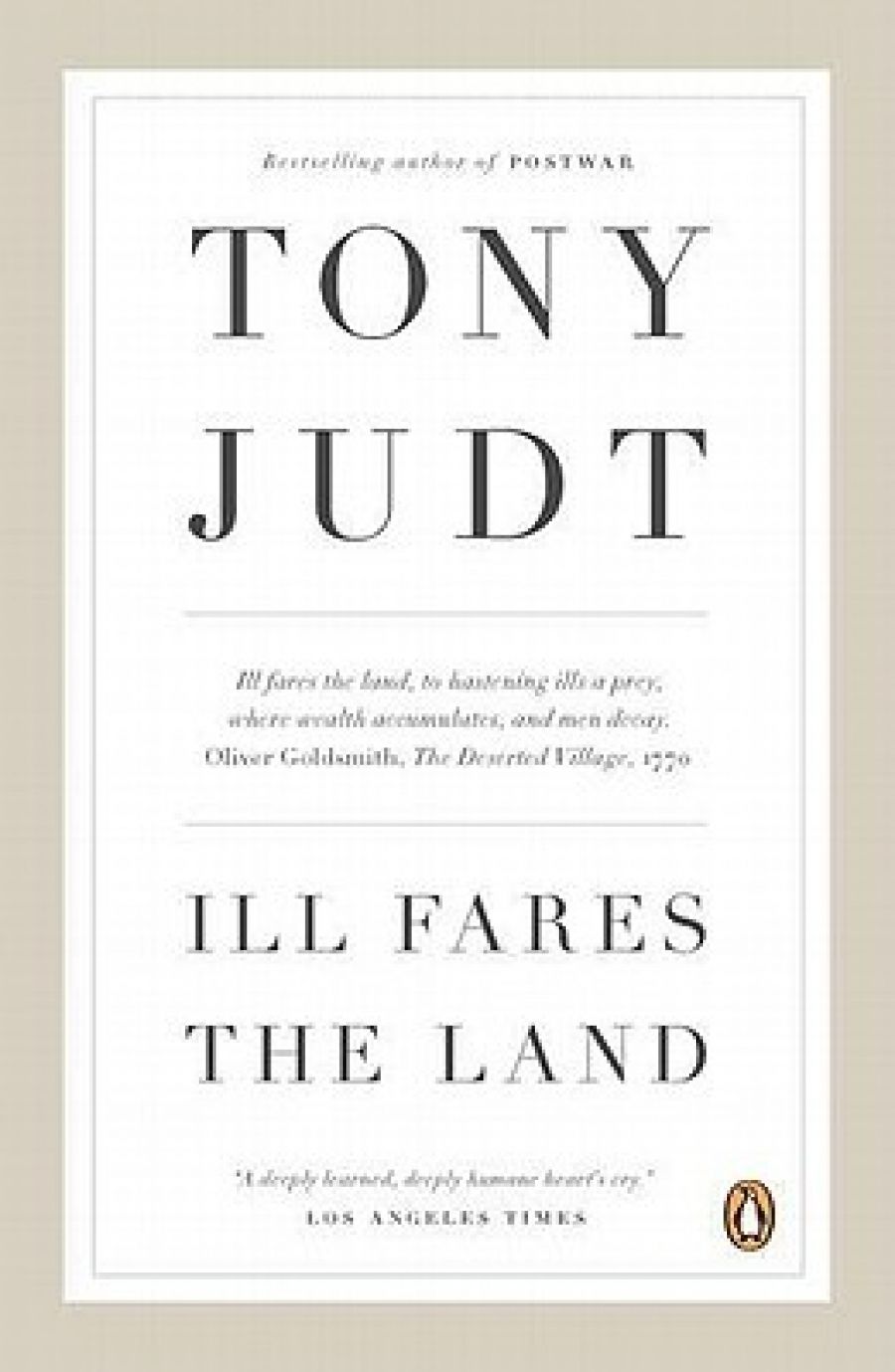
- Free Article: No
- Contents Category: Features
- Custom Article Title: Offerings and jeremiads
- Review Article: Yes
- Article Title: Offerings and jeremiads
- Online Only: No
- Custom Highlight Text:
These two books were written in the last stages of a fatal illness. What is remarkable about them is their poise. They show no signs of anguish, anger, or remorse. They remind us of the discipline of a trained and responsible mind, nimble and true to its calling until the end.
- Book 1 Title: Ill Fares the Land
- Book 1 Biblio: Allen Lane, $29.95 pb, 238 pp
- Book 2 Title: The Memory Chalet
- Book 2 Biblio: William Heinemann, $45 hb, 240 pp, 9780434020966
- Book 2 Cover Small (400 x 600):

- Book 2 Cover (800 x 1200):

- Book 2 Cover Path (no longer required): images/1_SocialMedia/2021/May_2021/9413960.jpg
In 2009, in his last public appearance, Tony Judt used the Remarque Lecture at New York University to issue a clarion call for social democracy, opposing libertarians and free marketeers alike. He expands the lecture in Ill Fares the Land. The Memory Chalet is a set of memoir essays, composed in his head during long periods of forced solitude, then dictated, or, when his voice finally failed, transcribed through an electronic device. He describes how this was done. His neurodegenerative disorder (amyotrophic lateral sclerosis, or ALS) ‘leaves your mind clear to reflect upon past, present and future, but steadily deprives you of any means of converting these reflections into words’. His chalet is both a mnemonic trigger (of happy days in a family hotel in an unfashionable Swiss village) and a storage device into whose rooms and spaces he places the topics that become the chapters of his book (Putney; The Green Line Bus; Paris Was Yesterday; Go West Young Judt; Midlife Crisis; Captive Minds; Girls, Girls, Girls, and so on).
In an appreciation in The New York Review of Books, Timothy Garton Ash tells how, at one of his last appearances, ‘wrapped in a blanket on his large electric wheelchair, with a bi-pap breathing device strapped over his head’, Judt observed that some colleagues had suggested he speak about his illness in a suitably uplifting way. ‘I’m English and we don’t do “uplifting”.’
A contrarian, Judt is, however, neither perverse nor vexatious. He can be brusque and offensive, but also beguiling; you find yourself adopting his position, although you had thought you were steadfastly opposed. A Jew, who was in his youth an ardent kibbutzim Zionist, he turned against the Israel that most Jews feel they are obliged to support. Judt was English, but as a scholar he was more interested in Europe. As an historian of Western Europe, he decided it was in Eastern Europe, especially Czechoslovakia, that the intellectual and moral issues of the Cold War were understood. He became an American citizen, though he remained a stalwart defender of the European political model that most Americans regard as the Trojan horse of deficit budgets and state socialism. He defies the mantra that personal is public by barely mentioning his three marriages, although he is warm and generous about his contemporary family.
He is cosmopolitan, but his favourite country is Switzerland, home of burgher decency, and his ideal place in Switzerland is Murren, a mountain village where nothing happens. (‘Nothing ever went wrong there.’) Bad Switzerland is ‘Italian floozettes in microkinis and fur booties … draped across hard-faced Russians helicoptered to the summit sporting the latest gear. Debbie Does Davos …’Good Switzerland is, ‘And then, as out of nowhere, there appeared around the corner three little old men: swathed in wool and leather, their ruddy, sensible-looking faces topped by sensible-looking hats. Hands firmly gripping stout climbing sticks, they plumped their substantial backsides onto a bench and unlaced their weathered boots. Sublimely indifferent to the dolce vita unfolding before them, the gnarled mountaineers congratulated one another in incomprehensible Switzerdeutsch on what must have been a gruelling ascent …’
Judt is saved from grumpy nostalgia by a passion for reform. His favourite British politician is Clement Attlee, a modest man (who, Churchill said, had much to be modest about). His Attlee is an exemplar of the great age of middle-class Edwardian reformers, ‘morally serious and a trifle austere’. Judt does not relish austerity, but he admires reform and Attlee, Labour prime minister from 1945 to 1951, presided over a reforming government. Judt is suspicious of charismatic leaders. In a passage on politicians as painters, Franklin Roosevelt is Titian and Churchill is Rubens: Attlee is Vermeer, precise, restrained, undervalued. Clinton ‘might aspire to the heights of Salvador Dalí (and believe himself complimented by the comparison), Tony Blair to the standing – and cupidity – of Damien Hirst’. The key to Judt’s critical judgement is moral seriousness. ‘Moral seriousness,’ he writes, ‘is like pornography, hard to define but you know it when you see it.’
His style is temperate rather than polemical, allusive rather than dogmatic. He is not easy to pin down. I suspect that, like Michael Oakeshott, he does not believe in conclusions, preferring conversation to meander according to the quality of those taking part. The reader is left with impressions and suggestions, jostling each other for attention. He avoids the catcalls and blazing generalities that pass for debate in today’s cyber world. As a public intellectual he limited his Op-Eds to journals, especially The New York Review of Books.
At one point, Judt seems to be making an argument for ‘law’ as an alternative to ‘force’ in the development of ‘order’, but, suspicious of over-the-horizon speculation, relying on what he has seen and heard, felt and experienced, studied and analysed, it is hard for him to be confident of the status of international, even national, law in today’s uneasy world of bristling, riven nations. So he checks his enthusiasm. At another point, he tantalises with what he calls the ‘incoherence of meritocracy’, which he describes as giving everyone a chance and then privileging the talented.
Judt’s central concern emerges in ‘The Unbearable Lightness of Politics’ in Ill Fares the Land, where he juggles community, society, and the state. (Incidentally, neither book has an index, so it is wise to have pad and pencil on hand.) Throughout this book, and never far beneath the surface in the other, is the idea that for the last thirty years (since the end of the Cold War), ‘we’ (meaning the Western democracies) ‘have made a virtue out of the pursuit of material self-interest’. He brings discussion to a head with the argument that privatising of public goods has produced an ‘eviscerated society’, a ‘thin membrane’ of interaction between individuals, with ‘nothing except authority and obedience binding the citizen to the state’. The twist in Judt’s logic, which put him in conflict with both sides during the Cold War, is that, while this may have been the ambition (or an unintended consequence) of libertarians and free marketeers, ‘we should never forget that it was first and above all the dream of Jacobins, Bolsheviks and Nazis: if there is nothing that binds us together as a community or society, then we are utterly dependent on the state.’ This grand statement needs evidence, which Judt provides in his historical writings, but not here. Rather, he quotes Edmund Burke’s critique of the French Revolution: any society that destroys the fabric of the state must soon be ‘disconnected into the dust and powder of individuality’.
Recruiting a conservative to his cause is typical of Judt’s subtle polemics, but it is not just clever tactics. He is convinced that the state has a role in ensuring equity and justice, and he also thinks that, despite all the talk about a borderless world and the end of history, the state is here to stay. His comments on the G20 group are typical. He is sceptical about its role as global executive, pointing out that it is resented by those excluded, but concludes that ‘the emergence of such a grouping surely confirms the return of the state to centre stage’. He leaves us, not with a message, but with a feeling that we must get right the nature of the state, not so powerful that it overwhelms the individual conscience with its sovereign demands, nor so intrusive that it pampers adolescence, but neither so weak that it cannot protect liberty. He does not trust ideology, whether of the economic, political, or moral variety, and he also believes that a strong civil society can tame both the state and the market.
For an Australian reader, Judt is both charming and provoking, but shows little interest in our part of the world – China, Japan, Indonesia, and the Asia-Pacific region as the production powerhouse of the twenty-first century. His interest in India is mainly through the British connection. As for Australia, he seems not to have heard of it. He notices New Zealand and Canada, but Australia’s egalitarian reputation and dogged pursuit of the mechanics of democracy, such as compulsory and preferential voting, seem not to have registered. Among his chalet memoirs is The Lord Warden, which was the name of the British Railways flagship ferry that his family liked to use on trips to Europe, named after the Lord Warden of the Cinque Ports – five coastal settlements given special freedoms by the English Crown in 1155. When Robert Menzies retired from politics in 1966, he took this ceremonial post – to the surprise of most Australians, who had never heard of it – and held it until he died in 1978. Judt does not mention this. Why should he? He has more important matters on his mind.
CONTENTS: MARCH 2011


Comments powered by CComment